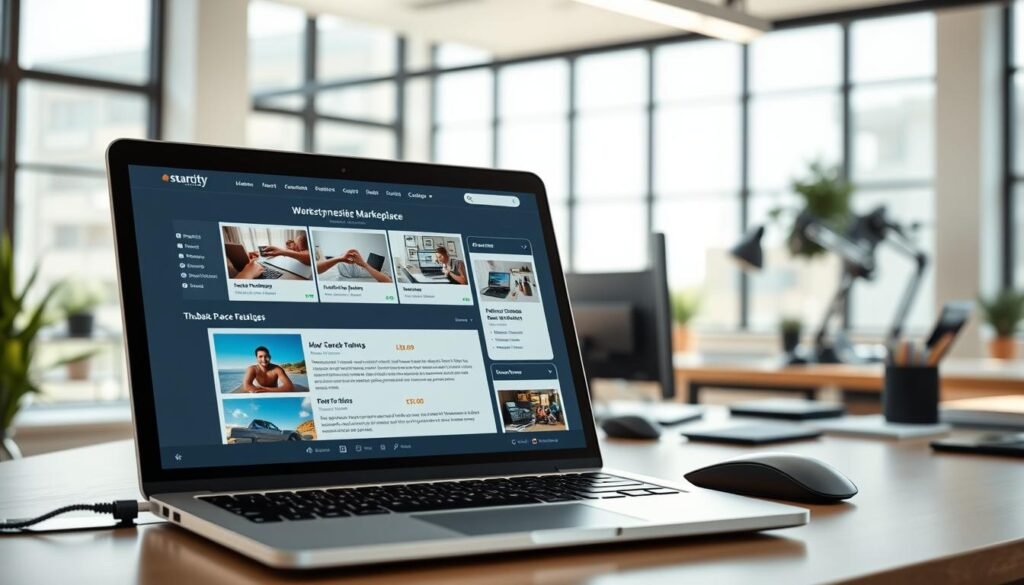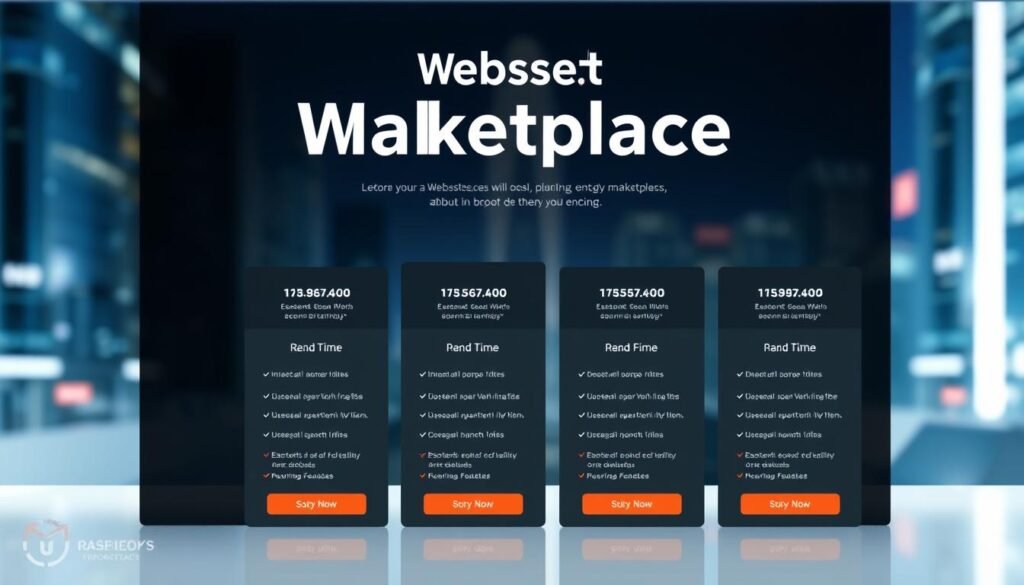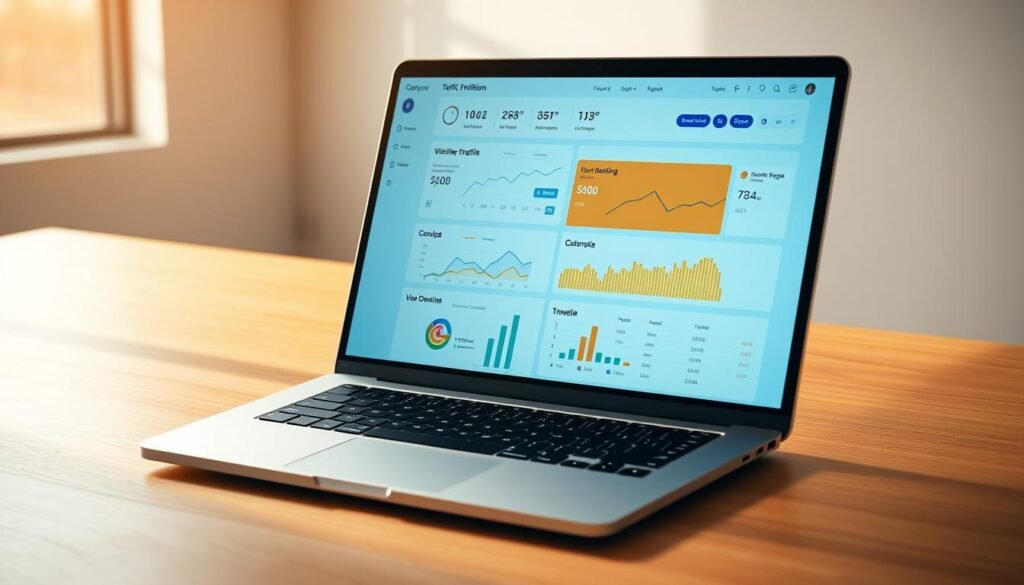Have you ever wondered how entrepreneurs buy and sell profitable websites without the hassle of traditional brokers? The digital marketplace has revolutionized the way online businesses change hands, offering speed, transparency, and lower fees.
Since 2009, Flippa has been a leading platform for buying and selling websites, domains, and apps. With over 3 million registered users, it connects buyers and sellers through auctions or fixed-price listings. Whether you’re looking to sell an online business or acquire a revenue-generating asset, this marketplace provides the tools for seamless transactions.
The platform caters to various digital assets, including eCommerce stores, SaaS platforms, and mobile apps. Unlike traditional brokers, it allows users to vet opportunities independently while benefiting from AI-driven buyer matches. Over 60% of deals start via mobile, making it accessible anytime, anywhere.
Key Takeaways
- Flippa is a trusted marketplace for buying and selling websites since 2009.
- It supports auctions and fixed-price listings for flexibility.
- Transactions range from $500 to over $1 million.
- Mobile optimization drives most deal initiations.
- Self-vetting is required, but fees are lower than traditional brokers.
Introduction to Flippa: The Digital Marketplace
The digital marketplace landscape transformed when a developer forum expanded into a global platform for online business transactions. Originating from the SitePoint community, it now processes over $200M annually, hosting 1,500+ live listings daily.
This platform leads the market for SME digital assets under $500K, with 78% of buyers based in the U.S. and 62% of sellers operating internationally. Unlike competitors focused on SaaS, it specializes in content-driven websites.
Financial safety is prioritized through Escrow.com integration, active since 2015. The user base includes 68% first-time buyers and 42% serial entrepreneurs. A key differentiator? No minimum revenue requirements, making it accessible for startups.
How Flippa Works for Buyers and Sellers
Navigating website transactions requires understanding how marketplaces streamline deals. For buyers, it’s about finding vetted assets. For sellers, it’s maximizing visibility. The platform balances both needs with structured workflows.
Types of Listings: Websites, Apps, and Domains
Listings range from content sites to SaaS platforms. Domains with traffic and apps with active users also feature prominently. Each category has unique valuation metrics.

Fixed-Price vs. Auction Listings
Fixed-price offers instant purchases, ideal for buyers seeking certainty. Auctions drive competitive bidding, often fetching higher seller returns. Choose based on urgency and budget.
The Role of Flippa’s Escrow Service
Mandatory for sales over $5K, escrow ensures secure fund transfers. Sellers grant DNS/Google Analytics access during a 7-day inspection. Disputes trigger a 72-hour mediation window.
Fees start at 1.5% for deals under $25K. Wire transfers are required above $50K. Cryptocurrency payments carry a 3.5% processing fee. Always conduct due diligence before release.
Why Choose Flippa? Key Benefits for Buyers
Smart investors know finding undervalued digital assets can boost ROI significantly. The right platform delivers both quality listings and favorable purchase terms. Here’s what sets this space apart for serious buyers.
Lower Multiples Compared to Other Marketplaces
Website valuations here average 28x monthly profit versus 35x at premium brokers. This price advantage comes from direct seller-buyer transactions cutting intermediary fees.
Sellers often accept 73% of asking prices during negotiations. The valuation formula weighs seller discretionary earnings (SDE) more heavily than EBITDA. This benefits buyers with clearer cash flow visibility.
Access to Diverse Digital Assets
From content sites to SaaS tools, inventory spans 12+ business models. Unlike niche platforms, this marketplace mixes established sites with growth opportunities.
68% of sellers aim for quicker exits than broker timelines allow. This creates motivated sellers open to reasonable offers. Always verify revenue streams during due diligence.
Case Study: A $12,000 purchase now generates $600 monthly profit. The buyer negotiated from $15,000 by highlighting growth potential the seller hadn’t maximized.
Understanding Flippa’s Pricing Structure
Budgeting for a website purchase involves more than just the listing price. Hidden fees and post-acquisition costs can impact your income potential if overlooked. Here’s how to navigate the financial aspects confidently.
Listing Fees and Success Fees
The platform charges sellers a 10% success fee for closed deals, plus listing fees starting at $15. Buyers face no upfront costs but ’ll need to account for a 12% platform fee on the final price. These fees fund escrow services and dispute resolution.

Budgeting for Your Purchase
Allocate a 20% buffer beyond the purchase price for unexpected expenses. Common add-ons include development tweaks ($500-$5,000) and legal transfers. Financing partners like LendingTree offer loans for qualified buyers.
Plan for a 14-month breakeven period on average. Maintain six months of operating capital as a safety net. Tax-wise, Section 197 lets you amortize intangible assets over 15 years, easing budget strain.
Pro Tip: Compare multiple listings’ ROI timelines. Sites with stable traffic often justify higher upfront costs through faster returns.
Vetting Listings: How to Avoid Scams
Smart buyers know that thorough verification separates real opportunities from risky deals. With 40% of buyers reporting inflated revenue claims, scrutinizing listings is critical. Focus on transparent data and third-party validation to minimize risks.
Spotting Red Flags in Listings
Unrealistic profit multiples (e.g., 5x monthly revenue) often signal exaggeration. Sellers avoiding live traffic verification or providing blurry analytics screenshots raise immediate concerns. Check for consistent revenue patterns—sudden spikes without clear causes may indicate manipulation.
Other warning signs include vague descriptions of monetization methods or refusal to share supplier contacts. Always request legal documentation for existing contracts, like ad network agreements or affiliate partnerships.
Verifying Traffic and Revenue Claims
Demand real-time Google Analytics 4 (GA4) access with screen sharing. Validate ad revenue by reviewing Ezoic or Mediavine dashboards directly. A clean backlink profile with an Ahrefs spam score under 15% adds credibility.
For eCommerce sites, contact drop-shipping suppliers to confirm order volumes. Cross-check PayPal or Stripe statements against claimed earnings. This due diligence ensures you’re buying sustainable traffic, not temporary spikes.
Pro Tip: Compare the seller’s claimed metrics with SimilarWeb estimates. Discrepancies over 20% warrant deeper investigation.
The Due Diligence Process on Flippa
Due diligence separates profitable purchases from costly mistakes in digital asset transactions. Gathering accurate information upfront prevents surprises post-purchase. Over 90% of legitimate sellers provide full access to analytics—leveraging this transparency is key.
Essential Questions to Ask Sellers
Start by verifying hosting costs and software expenses. Cross-reference tax returns (Schedule C) with claimed profits to spot inconsistencies. Ask for merchant account details to review chargeback rates—a red flag if above 2%.

Confirm ad account ownership in Google Ads or Meta Business Manager. Sellers withholding access often exaggerate revenue. Prioritize engagement rates over raw pageviews—high bounce rates may indicate bot traffic.
Reviewing Google Analytics and Financial Records
Analyze GA4 data for steady traffic sources, not sudden spikes. Compare ad revenue dashboards (Ezoic/Mediavine) with PayPal statements. Hosting invoices should align with claimed site age—discrepancies suggest falsified histories.
Pro Tip: Screen-share live analytics sessions. Blurred screenshots or refusal to share real-time data warrant walking away.
Negotiation Strategies for Buyers
Mastering negotiation tactics can significantly impact your website purchase success. Whether you’re a first-time buyer or a seasoned investor, structured offers and secure payment terms protect your interests.
Setting Realistic Offer Ranges
Start by analyzing comparable listings to gauge fair market value. Offers 15-20% below asking prices often open discussions, especially if you highlight growth opportunities the seller missed.
Consider milestone payments—50% upfront and 50% post-migration—to mitigate risks. Always verify asset ownership through DNS records and registrar transfers before releasing funds.
Leveraging Escrow for Secure Transactions
Escrow services resolve 93% of transactions smoothly, but disputes occur in 7% of cases. Protect yourself by confirming IP rights and patent assignments during the inspection period.
Require a 14-day training period for knowledge transfer. Post-sale support via 30-day consulting agreements ensures continuity. These steps reinforce due diligence and build trust.
Tips for First-Time Flippa Buyers
Entering the website marketplace as a new buyer requires strategic planning to minimize risks. While the platform offers numerous opportunities, focusing on proven acquisition methods increases your chances of success. First-time buyers ’ll need to prioritize due diligence and niche alignment for optimal results.
Why Established Websites Deliver Better Value
Websites operating for 2+ years typically show more stable performance metrics. These mature assets often have established traffic patterns and proven monetization systems. Niche experts achieve 41% faster ROI by targeting businesses with historical data.
Conduct competitor analysis using tools like Ahrefs to compare domain authority scores. Review existing supplier networks and content gaps in your target niche. This reveals opportunities to enhance an established business rather than building from scratch.
The Advantage of Familiar Industries
Purchasing in known niches reduces the learning curve significantly. You’ll recognize quality content, understand audience needs, and evaluate monetization methods more effectively. Align ad networks with visitor demographics for maximum revenue potential.
Consider 5-year growth projections before acquiring any digital asset. Sites in expanding markets often appreciate faster, creating exit opportunities. This forward-thinking approach separates casual buyers from strategic investors.
Flippa Alternatives for Buying Websites
Exploring other platforms expands your options for acquiring digital assets. While Flippa dominates the mid-tier market, specialized alternatives cater to niche needs and higher-value deals. Each marketplace offers unique filters, vetting processes, and pricing structures.
Empire Flippers: High-End Listings
This premium broker focuses on established businesses with verified revenues. Listings often exceed $100K, featuring eCommerce stores and SaaS platforms. Their team pre-vets all assets, reducing buyer due diligence.
MotionInvest: Niche Content Sites
Ideal for content-driven buyers, MotionInvest specializes in blogs and affiliate sites. Listings include detailed traffic breakdowns and monetization histories. Their escrow process ensures secure transfers for under-$50K deals.
Other Marketplaces Compared
FE International excels in SaaS businesses over $1M, while Quiet Light Brokerage targets eCommerce stores above $500K. Investors Club offers membership-based access to premium deals, and Shopify Exchange simplifies dropshipping store purchases.
Latona’s specializes in aged domain portfolios, and MicroAcquire connects buyers with startups under $500K. Evaluate each platform’s fees, asset types, and support services to match your acquisition strategy.
Maximizing Success After Your Purchase
Owning a website is just the beginning—optimizing it post-purchase drives real success. Over 60% of buyers implement growth plans within three months, turning acquisitions into high-performing assets. Strategic upgrades and smooth transitions separate thriving owners from those who struggle.

Transitioning Ownership Smoothly
Start by migrating DNS settings and analytics access immediately. Request admin privileges for all connected platforms, from Google Search Console to ad networks. A 14-day training period with the seller ensures knowledge transfer for critical operations.
Update legal documents, including privacy policies and terms of service. Verify domain ownership through WHOIS records before finalizing payments. These steps prevent disruptions to your business operations post-transfer.
Scaling Your New Website
Boost content production using AI-assisted tools for faster article creation. Prioritize monetization upgrades like direct ad sales over passive networks. Technical improvements, especially Core Web Vitals optimization, enhance user experience and search rankings.
Diversify traffic sources by integrating Pinterest pins or YouTube tutorials. Plan an 18-24 month growth runway with clear milestones. Regular performance reviews help adjust strategies based on real data, not assumptions.
Conclusion: Is Flippa Right for You?
Deciding whether to use this marketplace depends on your goals and expertise. With a 78% satisfaction rate for deals under $50K, it suits buyers who prefer hands-on vetting. The platform works best for those comfortable analyzing traffic and revenue data directly.
Sellers benefit from faster transactions compared to traditional brokers. Escrow services and third-party audits reduce risks for both parties. Recent trends show growing demand for micro-SaaS and content sites.
New users should start with smaller listings under $10K. This lets you test the process before larger investments. The right online business can deliver strong returns with proper due diligence.
FAQ
What types of digital assets can I buy and sell on this marketplace?
You can purchase or sell websites, apps, and domain names. The platform supports a variety of digital businesses, from ecommerce stores to content sites.
How does the pricing structure work for buyers?
The marketplace charges listing fees and success fees. Buyers should also budget for escrow services to ensure secure transactions.
What are the key benefits for buyers?
Buyers gain access to diverse digital assets at lower multiples compared to other platforms. The marketplace offers a wide selection of listings at competitive prices.
How can I avoid scams when browsing listings?
Check for verified traffic and revenue claims. Look for red flags like unrealistic earnings or incomplete financial records. Always conduct thorough due diligence.
What should I review before making a purchase?
Examine Google Analytics, financial statements, and traffic sources. Ask sellers detailed questions about revenue streams and expenses.
Are there alternatives to this marketplace?
Yes, Empire Flippers specializes in high-end listings, while MotionInvest focuses on niche content sites. Each platform has unique advantages.
What’s the best negotiation strategy for buyers?
Set realistic offer ranges based on comparable sales. Use escrow to protect funds and ensure a smooth transfer of ownership.
What tips help first-time buyers succeed?
Focus on established websites (2+ years old) and stick to niches you understand. Avoid overpaying for unproven businesses.
How do I transition ownership after buying a website?
Work with the seller to transfer domains, hosting, and accounts. Verify all assets before releasing escrow funds.
What’s the best way to scale a newly purchased website?
Optimize traffic sources, improve monetization, and expand content or product offerings. Track performance closely in the first few months.





